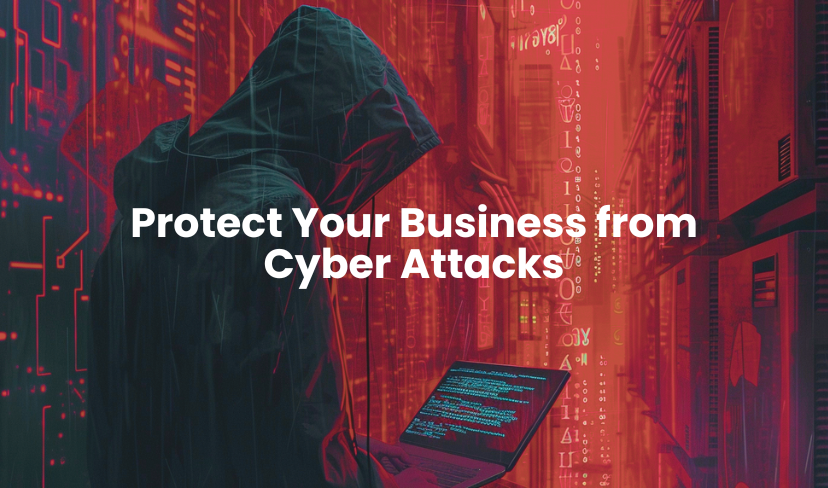“To Protect your business from cyber attacks is no longer a luxury for businesses; it is a necessity!“
The digital age brings immense benefits for businesses but also exposes them to potential threats like cyber attacks. These attacks can disrupt operations, damage your reputation, and even lead to financial losses. According to a 2023 report by IBM, the average global cost of a data breach reached a record high of $4.35 million, highlighting the significant financial impact these attacks can have. However, by taking proactive measures and efficient service provider, you can significantly reduce the risk of falling victim.
Here is where Transputec’s Cyber Security Experts can help. Transputec is a leading provider of cyber security services, offering a comprehensive suite of solutions to safeguard businesses from evolving threats. Specialising in proactive defence measures, Transputec delivers tailored cyber security services strategies to meet diverse needs. Their services encompass threat detection, vulnerability assessments, 24×7 Security Operations Center ( SOC ) and risk management.
How can you Identify Cyber Threats?
In the interconnected world of cyberspace, businesses are vulnerable to a myriad of threats ranging from phishing scams and malware to sophisticated hacking attempts. Understanding the different types of cyber threats is the first step towards implementing effective countermeasures.
Cyber threats come in various forms, including ransomware, phishing attacks, DDoS (Distributed Denial of Service) attacks, and insider threats. Each poses unique challenges and requires specific strategies for mitigation.
How to Protect Your Business from Cyber Attacks?
Safeguarding your business against cyber attacks requires a proactive approach and a multi-layered defence strategy. By implementing the following measures, you can significantly reduce the risk of a successful cyber attack.
1. Implement strong passwords and access controls:
- Encourage employees to use complex, unique passwords for all business accounts, with a minimum length of 12 characters and a combination of uppercase and lowercase letters, numbers, and symbols.
- Implement multi-factor authentication (MFA), requiring a second verification step beyond usernames and passwords. This significantly reduces the risk of unauthorised access even if login credentials are compromised.
2. Keep software updated:
- Regularly update your operating systems (patching), software applications, and security software like anti-virus and anti-malware. These updates often contain security patches that address vulnerabilities exploited by attackers. According to a 2022 Ponemon Institute study, 74% of data breaches involved exploiting unpatched software vulnerabilities.
3. Educate your employees:
- Train your employees on cybersecurity best practices, including how to identify and avoid phishing emails (which account for 91% of all cyber-attacks according to a 2022 Verizon Data Breach Investigations Report), suspicious websites, and social engineering tactics. Encourage them to report any suspicious activity immediately. Deploy solutions like CybSafe for your teams to monitor and maintain their education.
4. Back up your data:
- Regularly back up your critical business data to a secure location, preferably offsite and in the cloud and air gapped. This ensures you can recover information in case of a cyber-attack or other data loss incidents. According to a 2023 Datto report, 60% of businesses that experience a major data loss event go out of business within six months.
5. Use firewalls and network security solutions:
- Implement firewalls and other network security solutions to monitor and control incoming and outgoing network traffic, blocking suspicious activity. These solutions can help prevent unauthorised access to your network and sensitive data. But most importantly, keep the firewall software and rules updated.
6. Secure your Wi-Fi network:
- Use a strong encryption standard like WPA3 for your Wi-Fi network and avoid using public Wi-Fi networks for sensitive business activities. Public Wi-Fi networks are often unsecured and can be easily exploited by attackers.
7. Be cautious with external devices:
- Establish policies for connecting personal devices to the company network and accessing sensitive information. Consider implementing data loss prevention (DLP) solutions to prevent unauthorised data transfer on personal devices.
8. Have a cyber security incident response plan (IR plan):
- Develop a plan outlining how your business will respond to a cyber attack, including steps for containment, recovery, and communication. Having a plan in place can minimise downtime and damage in the event of an attack. Consider using platforms like Crises Control to manage critical scenarios.
9. Stay informed:
- Regularly stay updated on the latest cyber threats and vulnerabilities. Resources from government agencies (e.g., National Institute of Standards and Technology – https://www.nist.gov/cybersecurity), cybersecurity organisations (e.g., Cybersecurity & Infrastructure Security Agency – https://www.cisa.gov/), and industry publications can be helpful.
10. Consider professional help:
- For more complex security needs, consider consulting cybersecurity professionals or managed security service providers (MSSPs) like Transputec for additional expertise and ongoing support. This can be particularly beneficial for businesses lacking dedicated IT security staff.
By implementing these measures, you can significantly protect your business from cyber attacks. Remember, to protect your business from cyber attacks is an ongoing process, and it requires constant vigilance and adaptation to evolving threats.
For more information on how to protect your business from cyber attacks, contact Transputec who can guide you on cyber threats.

Interested in learning how we can help?
to Secure your Business!
Let’s begin this exciting journey together!
FAQs about Protecting Your Business from Cyber Attacks
1. What are the most common types of cyber attacks?
Common cyber attacks include phishing emails, malware attacks, ransomware attacks, and denial-of-service (DoS) attacks.
2. How can I tell if my business has been cyber attacked?
Signs of a cyber attack can include unusual network activity, slow system performance, missing data, pop-up messages demanding payment, or locked access to files.
3. What should I do if I suspect a cyber attack?
Immediately isolate the affected devices, disconnect them from the network, and notify your IT department or cybersecurity professional. Report the attack to the relevant authorities and consider seeking legal guidance.
4. How much does it cost to protect your business from cyber attacks?
The cost of protecting your business from cyber attacks can vary depending on your business size, security needs, and chosen solutions. However, investing in cybersecurity is crucial to avoid potential financial losses and reputational damage from cyber attacks.
5. Is cyber insurance worth investing in for businesses?
Cyber insurance can provide financial protection against the costs associated with a cyber attack, including data recovery, legal fees, and regulatory fines, making it a valuable investment for businesses of all sizes.







